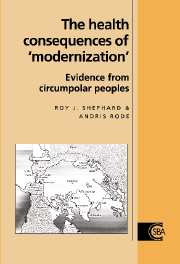Book contents
- Frontmatter
- Contents
- Preface
- 1 The circumpolar habitat and its peoples: traditional lifestyle and early research findings
- 2 Concept of the International Biological Programme Human Adaptability Project, and IBP studies of circumpolar populations
- 3 Changes in social structure and behaviour
- 4 Secular trends in diet, metabolism and body composition
- 5 Secular trends in physical fitness and cold tolerance
- 6 Secular trends in respiratory hazards, lung function and respiratory disease
- 7 Secular trends in growth and development
- 8 Current health status of circumpolar populations
- 9 Postscript: lessons from traditional circumpolar life and options for the future
- References
- Index
3 - Changes in social structure and behaviour
Published online by Cambridge University Press: 05 March 2012
- Frontmatter
- Contents
- Preface
- 1 The circumpolar habitat and its peoples: traditional lifestyle and early research findings
- 2 Concept of the International Biological Programme Human Adaptability Project, and IBP studies of circumpolar populations
- 3 Changes in social structure and behaviour
- 4 Secular trends in diet, metabolism and body composition
- 5 Secular trends in physical fitness and cold tolerance
- 6 Secular trends in respiratory hazards, lung function and respiratory disease
- 7 Secular trends in growth and development
- 8 Current health status of circumpolar populations
- 9 Postscript: lessons from traditional circumpolar life and options for the future
- References
- Index
Summary
‘Modernization’ has brought a multitude of changes in social structures and behaviour patterns to the indigenous circumpolar populations – a process that some authors have termed ‘acculturation’ (Berry, 1976; Forsius, 1980; Sampath, 1976). This chapter looks at objective measures of acculturation and the resulting acculturative stress or alienation, examining the extent and the social effects of cultural change in groups that, until recently, have followed a neolithic hunter-gatherer or pastoral lifestyle.
Measures of acculturation
In a study of Inuit living at Baker Lake and Lake Harbour, Freeman (1971a) measured acculturation in terms of sources of income (Table 1.1). He demonstrated a substantial change in the type of employment from 1951/52 to the late 1960s.
At the time of the 1969/70 IBP-HAP survey of Igloolik, Rode & Shephard (1973b) made a three-level classification of the occupation of adult men, based on extensive observation of the villagers and discussion with the community elders. The population was divided into those who were persisting with a traditional hunting lifestyle, those who had accepted wage-earning employment within the settlement, and an intermediate, transitional group who were accepting occasional paid work, but still persisted with some hunting. This classification, although simple, revealed substantial inter-category differences in aerobic power and skinfold thicknesses, both in summer and in winter (Table 3.1). The association between acculturation and measures of fitness became even more marked when the hunters were subdivided, based upon the frequency of their long (two to three week) hunting trips.
- Type
- Chapter
- Information
- The Health Consequences of 'Modernisation'Evidence from Circumpolar Peoples, pp. 58 - 86Publisher: Cambridge University PressPrint publication year: 1996
- 1
- Cited by



